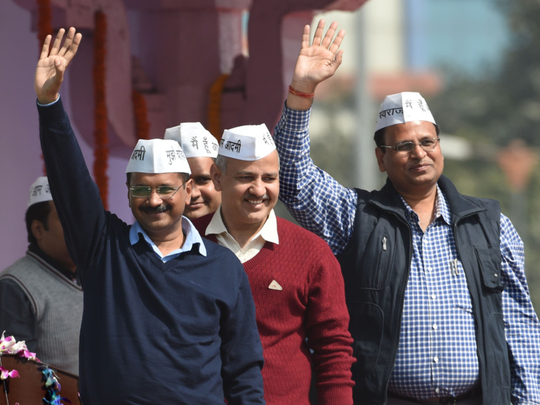
New Delhi: Arvind Kejriwal promised to make Delhi India’s first corruption-free state and end what he called its “VIP culture” as he was sworn in as chief minister Saturday in front of a huge crowd of cheering supporters.
The veteran antigraft campaigner also pledged to stick out his five-year term and said he would not succumb to arrogance after his upstart Aam Aadmi (Common Man) Party (AAP) won one of the biggest election victories the Indian capital has ever seen.
Kejriwal’s first term as chief minister lasted just 49 days and ended in chaos a year ago, sparking accusations he was fleeing the tough job of administration.
Despite that, his party took all but three of the 70 state parliament seats in elections held last Saturday after pledges to tackle entrenched corruption and lower utility bills won over legions of working-class voters willing to give him a second chance.
It was a remarkable turnaround for the 46-year-old former civil servant, who most pundits had written off after his AAP party won just four seats in last year’s general elections.
In his inauguration speech, Kejriwal admitted he had been over-ambitious in fielding so many candidates in the general election, and promised to focus on running the capital.
“I have decided that for the next five years we will only focus on Delhi. I will serve Delhi with all my heart,” he told the gathered crowd at the open-air ceremony.
“I will make Delhi corruption-free within five years. If somebody asks for a bribe, don’t say no. Just take your mobile out of your pocket and record it on your phone. You then come and give it to me. We will take the toughest action against the offenders.”
During his last brief tenure as chief minister, Kejriwal initially won rave headlines with his no-nonsense approach to endemic corruption, although his administration was soon embroiled in stand-offs with authorities.
‘End VIP culture’
On Saturday he said his government would eschew the trappings of power, including the red beacons that allow senior politicians to glide through traffic in the gridlocked city.
“In developed countries, even PMs wait at bus stands. Why can’t the same happen here?” he said.
“We want to end the VIP culture in this country.”
He also said people of all faiths should live in harmony in the Indian capital, which has suffered a recent spate of attacks on churches.
Kejriwal, whose supporters range from domestic servants to teachers to business entrepreneurs, based his election campaign around pledges to deliver cheaper water and electricity as well as a promise to counter corruption.
On Saturday he said the Congress party, which ruled Delhi for over a decade before suffering a humiliating defeat at the polls, had paid the price for being “arrogant”.
“They lost in Delhi because of their arrogance. So we must not let our victory go to our heads,” he said.
The new chief minister was dressed simply in a navy sweater and trademark white paper cap bearing the words “complete self-rule” - a reference to his ambition to secure greater autonomy for Delhi.
The central government retains greater powers in Delhi than in most states, including controlling the capital’s police force.
Tens of thousands turned out for the open-air ceremony at the Ramlila ground where Kejriwal also chose to have his first inauguration, in a break from the tradition of taking the oath in the state assembly.
Many carried Indian flags and wore the white paper hats printed with the words ‘common man’ in Hindi for which the AAP party is known.
During his last brief tenure as chief minister, Kejriwal famously declared himself an anarchist and staged several street protests outside government offices.
Before last Saturday’s election he apologised for leaving voters without an elected government for a year, telling the Times of India daily that he and his party had “evolved”.
Kejriwal’s style remains unconventional, but he appears eager to project a more grown-up image this time around.
He arrived at Saturday’s swearing-in by car, after famously travelling by metro to his first inauguration.
Posters at the site showed him dressed soberly in a shirt and jacket and without the trademark woolly scarf that earned him the nickname “Muffler Man”.
Kejriwal quit his comfortable and highly sought-after government job in 2001 and embarked on a career as an anti-corruption campaigner that led to national fame.
The taxman-turned-politician came to prominence as an adviser to elderly social activist Anna Hazare, whose 2011 anti-graft drive galvanised India.
He will chair his first cabinet meeting later in the afternoon.












